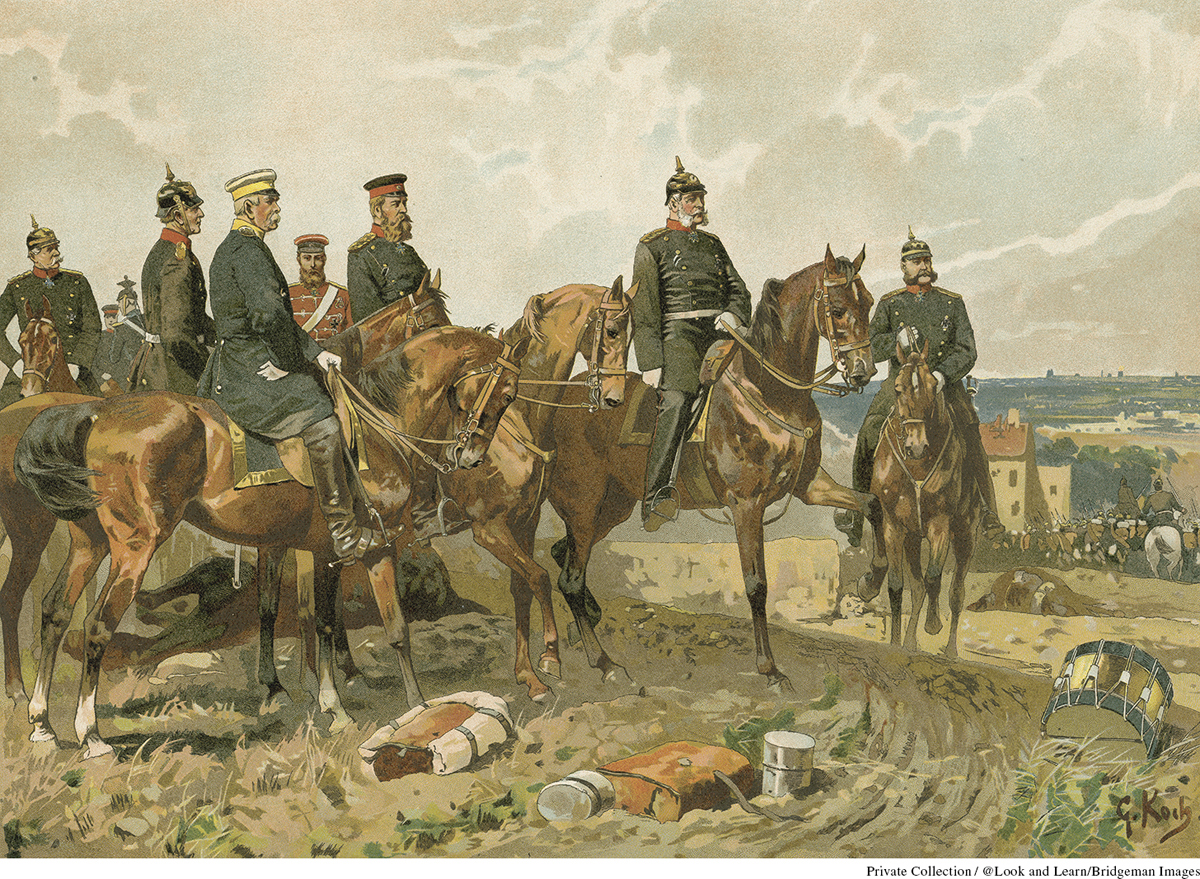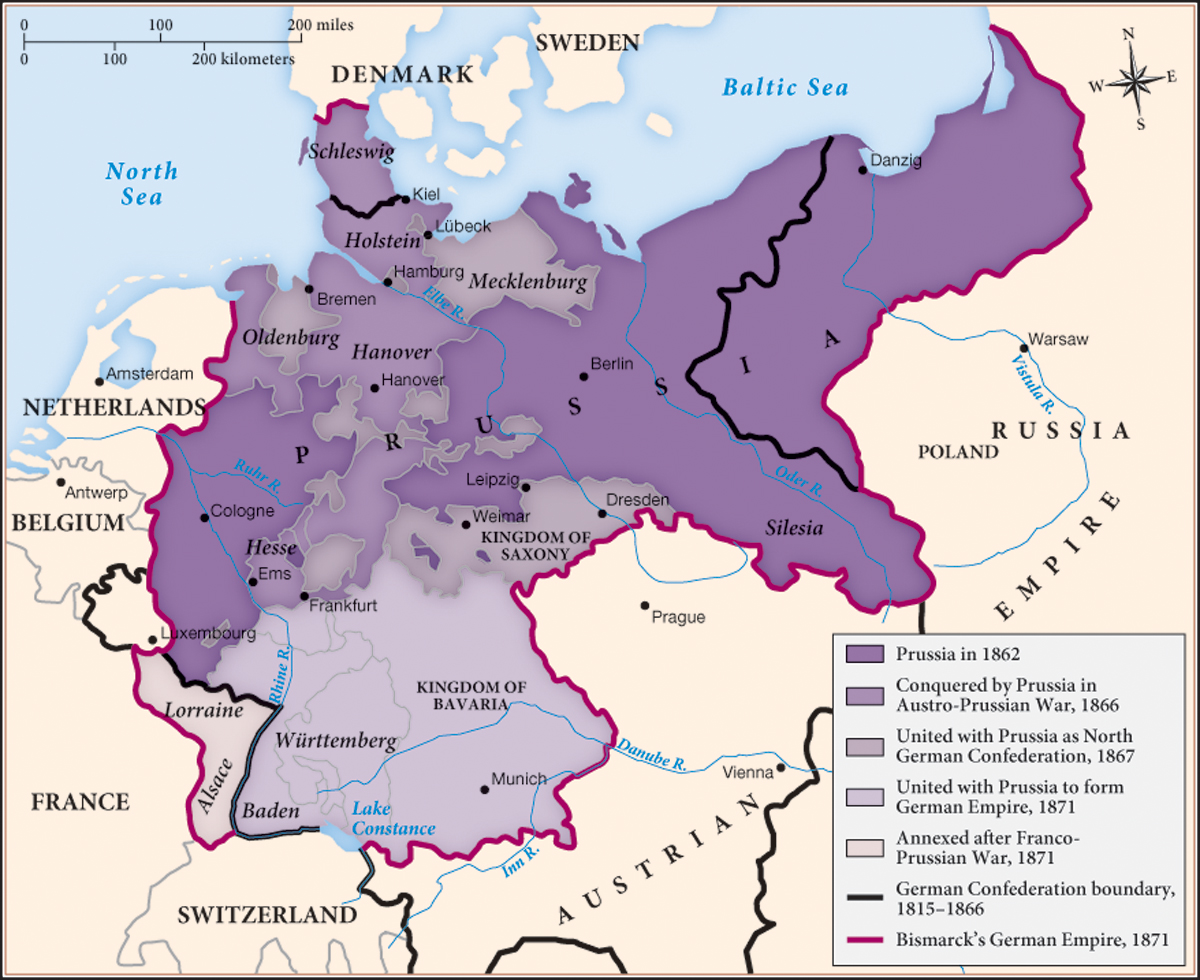Bismarck and the Realpolitik of German Unification
Bismarck and the Realpolitik of German Unification
The most momentous act of nation building for Europe and the world was the creation of a united Germany in 1871 under Prussian leadership. The architect of the unified Germany was Otto von Bismarck (1815–1898). Bismarck came from a traditional Junker (Prussian landed nobility) family on his father’s side; his mother’s family included high-ranking bureaucrats. At university, the young Bismarck had gambled and womanized. After failing in the civil service, he worked to modernize operations on his landholdings while leading an otherwise decadent life. His marriage to a pious Lutheran woman gave him new seriousness. In the 1850s, his diplomatic service to the Prussian state made him increasingly angry at the Habsburg grip on German affairs. Establishing Prussia as the dominant German power became Bismarck’s goal.
In 1862, William I (king of Prussia, r. 1861–1888; German emperor, r. 1871–1888) appointed Bismarck prime minister in hopes that he would crush the growing power of the liberals in the Prussian parliament. The liberals, representing the prosperous professional and business classes, had gained parliamentary strength at the expense of conservative landowners during the decades of industrial expansion. Indeed, the liberals’ wealth was crucial to the Prussian state’s power, but liberals wanted Prussia to be like other parts of western Europe, with political rights for citizens and increased civilian control of the military. William I, along with members of the traditional Prussian elite such as Bismarck, rejected the western European model. Acting on his conservative beliefs, Bismarck simply rammed through programs to build the army and prevent civilian control. “Germany looks not to Prussia’s liberalism, but to its power,” he proclaimed. “The great questions of the day will not be settled by speeches and majority decisions—that was the great mistake of 1848 and 1849—but by iron and blood.”

After his triumph over the parliament, Bismarck led Prussia into a series of wars: against Denmark in 1864, Austria in 1866, and France in 1870. Using war as a political tactic, he kept the disunited German states from choosing Austrian leadership and instead united them around Prussia. Bismarck drew Austria into the 1864 war over Denmark’s proposed incorporation of the provinces of Schleswig and Holstein, with their partially German population. The Prussian-Austrian victory resulted in an agreement that Prussia would administer Schleswig, and Austria, Holstein. That arrangement stretched Austria’s geographic interests far from its central European base: “We were very honorable, but very dumb,” Emperor Francis Joseph later said of being drawn into the Schleswig-Holstein debacle.
Austria proved weaker than Prussia, because the Austrian empire lagged in economic development. Bismarck, however, so encouraged Austria’s pretensions to grandeur that it disputed the administration of Schleswig and Holstein and in the summer of 1866 confidently declared war on Prussia itself. Within seven weeks, the modernized Prussian army won a decisive victory that allowed Bismarck to drive Austria from the German Confederation and create the North German Confederation, led by Prussia (Map 22.3).

To bring the remaining German states into Prussia’s expanding orbit, Bismarck next provoked France into war. The atmosphere became charged when Spain proposed a Prussian prince to fill its vacant royal throne. This candidacy at once threatened France with Prussian rulers on two of its borders and inflated Prussian pride at the possibility of its own princes ruling grand states. To get nationalist sentiments onto the news pages in both countries, Bismarck edited a diplomatic communication to make it look as if the king of Prussia had insulted France over the issue of the vacant throne. Publication of the revised telegram inflamed the French into demanding war. (See “Document 22.3: Bismarck Tricks the Public to Get His War.”) The parliament gladly declared it on July 19, 1870, launching the Franco-Prussian War. The Prussians captured Napoleon III with his army on September 2, 1870, and France’s Second Empire fell two days later.
A new French government struggled to carry on, and as Prussian forces besieged Paris, in January 1871 in the Hall of Mirrors at Versailles, King William of Prussia was proclaimed kaiser (“emperor”) of the new German Reich (“empire”). The peace terms ending the Franco-Prussian War, signed in May, required France to cede the rich industrial provinces of Alsace and Lorraine to Germany and to pay a multibillion-franc indemnity. Without French protection for the papacy, Rome became part of Italy. Germany was now poised to dominate continental politics.
Prussian military might served as the foundation for German nation building, and a complex constitution for the German Empire ensured the continued political dominance of the aristocracy and monarchy—despite the growing wealth and influence of the liberal business classes. Kaiser William, who remained Prussia’s king, controlled the military and appointed Bismarck to the powerful position of chancellor for the Reich. Individual German states were represented in a council called the Bundesrat, while the Reichstag was an assembly elected by universal male suffrage. The Reichstag ratified all budgets but had little power to initiate programs. In framing this political settlement, Bismarck accorded rights such as suffrage in the belief that the masses would uphold conservatism and the monarchy out of their fear of modernizing, exploitative businessmen. Taking no chances, he balanced this move with an electoral system in Prussia in which the votes from the upper classes counted more than those from the lower. He had little to fear from liberals, however. Dizzy with German military success, liberals came to support the blend of economic progress, constitutional government, and militaristic nationalism that Bismarck represented.